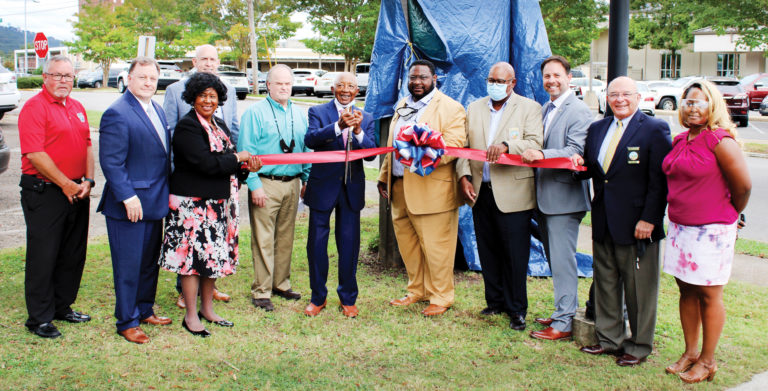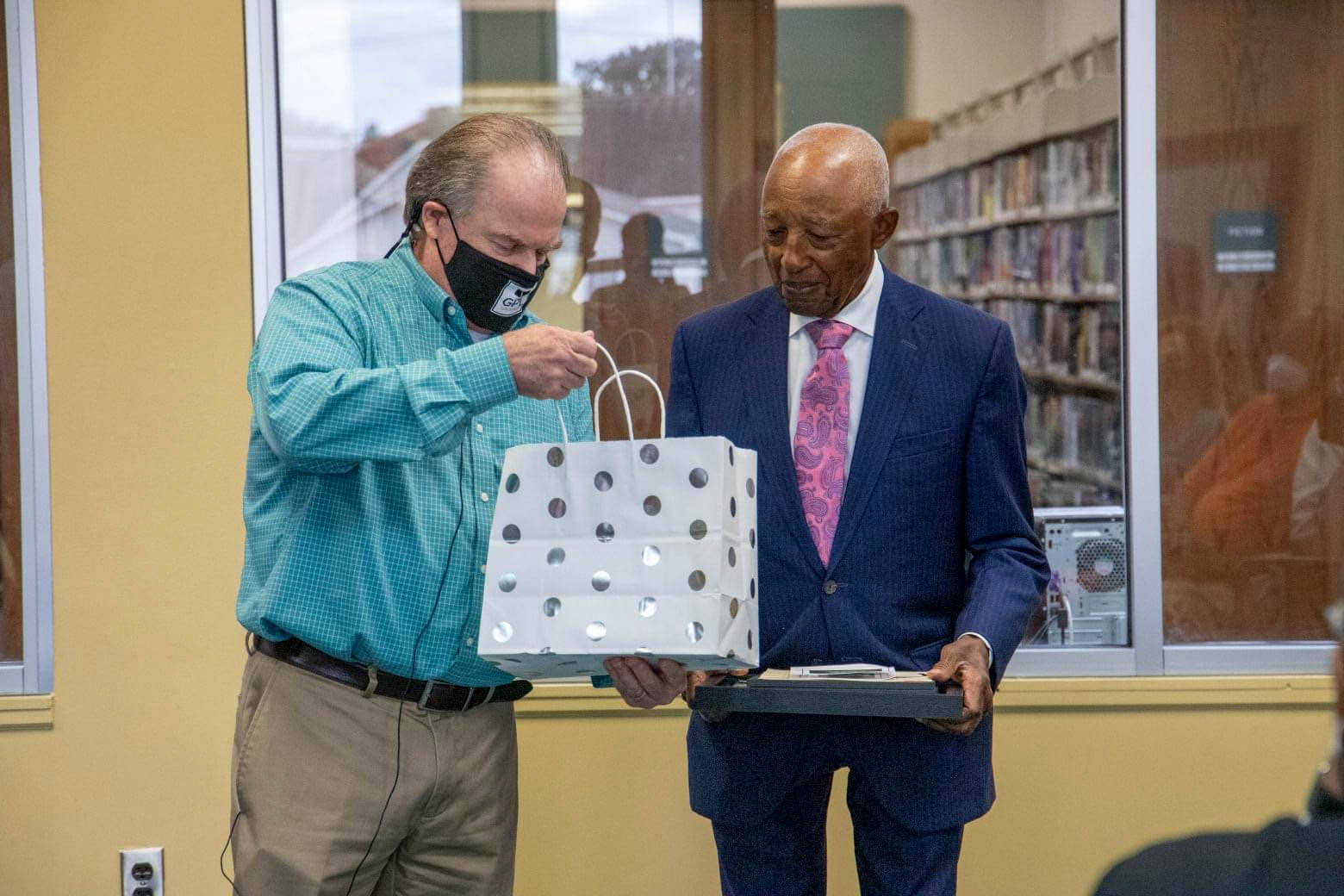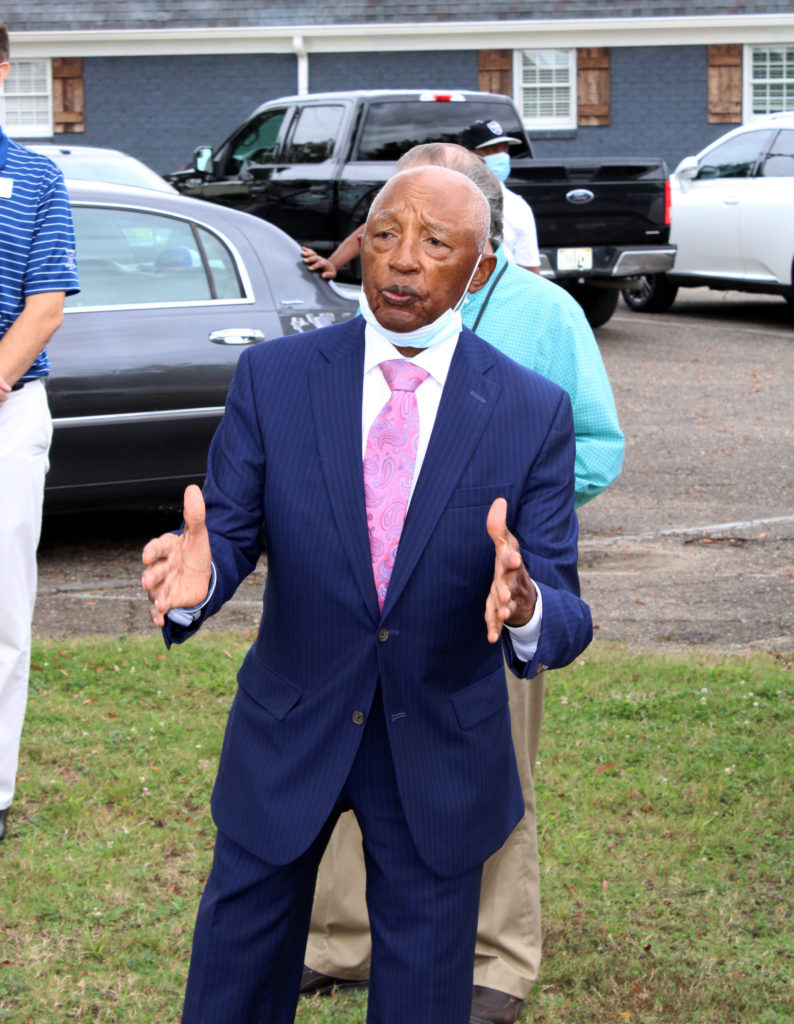Gadsden native Dr. Clarence Underwood Jr. (holding scissors) cuts the ribbon dedicating the Gadsden Public Library park in his honor, surrounded by elected officials and supporters inspired by his lifelong work and contributions to education and athletics. Katie Bohannon/Messenger.
By Katie Bohannon, News Editor
An inspiration returned home in early October, with Gadsden welcoming a true champion back to its city’s namesake.
The City of Gadsden orchestrated a day enriched with speeches, resolutions and a ribbon cutting commemorating the dedication of the Gadsden Public Library park in honor of Dr. Clarence Underwood Jr. – a man whose contributions stretched far beyond Etowah County, and at 88 years of age, illustrates a lifetime of achievement.
“Naming the library park for Dr. Clarence Underwood, Jr. was an easy decision for me and for the City of Gadsden,” said Gadsden Public Library Director Craig Scott, who proved instrumental in the park’s dedication. “Dr. Underwood is a dedicated and lifelong educator with an illustrious career of mentoring thousands of students of all ages and keeping them on the right path to success. With the Gadsden Public Library’s mission of enriching lives, inspiring ideas, and creating community, GPL is likewise dedicated to helping educate all who come through our doors or access our resources via the Internet. Dr. Underwood is an educator who mirrors GPL’s mission, and naming the park for him made complete sense.”
“I think the dedication of the park is another step forward in the progression of our city,” said Carver Community Revitalization Committee President Larry Avery, who is Underwood’s nephew. “I think it gives a sense of love to a person like Dr. Underwood with good ethos who left the city to strive to great heights in life, that represents the city from a distance. It shows that the city has not forgotten [its people].”
Raised in Black Creek until a move to Sixth Street, Underwood grew up one of eleven children living in a three-room house. Despite financial difficulties, Underwood accredits his wonderful mother and father with instilling within him the ethical characteristics that guided his life. He attended West Gadsden Elementary School and later Carver High School, interacting with coaches L.V. Johnson and L.C. Presley. Last year, Underwood was inducted into the Etowah County Sports Hall of Fame.
Athletics encompassed Underwood’s life from an early age, with his natural ability and talent earning him prominent positions as a three-sport letterman in football, baseball and track at Carver. Underwood soared as captain of the football team from his sophomore to senior year in high school, while playing shortstop for men’s amateur baseball teams at thirteen-years-old. Surrounded by elders, Underwood matured quickly, garnering motivation to play harder than those before him. Though his physical stature was small, Underwood’s character towered to great heights, his tenacity and commitment to perfecting his skills emerging evident in his tremendous feats.
“I think we all have gifts inside; we’re born with gifts,” said Underwood. “I think sports was one of my gifts because I never got tired of playing. I learned that it’s not how big you are, it’s not how good you are – it’s how you play. Your performance makes a difference.”
Underwood’s athletic accomplishments earned him a partial scholarship to Tuskegee University, where he would run track and play baseball; but not football, his passion. While Underwood contemplated juggling sports, academics and a part-time job to cover the remainder of his tuition, he met a friend on Sixth Street who planted an alternate idea in his mind: joining the military.
Underwood’s friend encouraged him to volunteer for the army to further his education, prompting him to join the U.S. Army 82nd Airborne Division from 1953 to 1955. As Underwood thrived in basic training and beyond, relishing the challenges that arose as grander opportunities to better himself, a transformative moment at Fort Bragg, North Carolina served as a pivotal catalyst for his future.
After patrolling the property on guard duty one evening, Underwood turned on the television to Michigan State and UCLA battling for the 1954 Rose Bowl. Though the two teams clamored for the win, the feuding did not catch Underwood’s gaze – rather, the image of unity and cooperation that appeared on screen. During high school, Underwood longed for the opportunity to compete against schools like Emma Sansom and Gadsden High, but never received the chance. That first of January Underwood witnessed the representation of a dream he always possessed manifesting in Pasadena, as numerous black athletes played alongside their white teammates, making an impressive impact on Michigan State’s success and working together to achieve greatness. Tuskegee drifted further from Underwood’s thoughts. Michigan called him by name.
While Underwood played baseball throughout the southeast, prior to his Michigan move he never stepped foot north of Tennessee. Alabama dwindled in Underwood’s rearview mirror as he and his wife, high-school sweetheart Noreese, traveled to Michigan. Driven toward Michigan State’s inclusive football team, Underwood felt he could pursue his athletic and academic goals in a new place. Underwood shared that though the equality he witnessed during the Rose Bowl coincided with the perception of northern states fostering greater freedom for black individuals, the reality of racism continued to rear its heinous head. As Underwood studied, worked and strived to obtain both his Bachelor’s and Master’s degrees in health and physical education, he endured and overcame the same obstacles and prejudice divisions he faced in the south.
“When I got to Michigan State, I found out that it was probably the same kind of attitude about racism as it was in Alabama,” said Underwood. “I didn’t see much difference because the attitude makes a difference…it’s the culture that makes a difference. I give my mother a lot of credit [in helping me breach those barriers]. She told us kids growing up, ‘Never hate anybody. Don’t hate – that’s the worst thing you can do.’ If somebody doesn’t like you, just walk away from them. You don’t have to retaliate by hating them. I never learned to hate; I was very tolerant of all people. I guess that helped me along the way.”
Narrow mindsets and societal injustices could not taint Underwood’s fulfillment of his purpose, which surfaced as a remarkable educator and mentor. Underwood began his illustrious career in the East Lansing public school system, where he quickly amassed appreciation and recognition. Working in East Lansing was a two-way street – Underwood loved his students and they loved him.
Underwood’s work in East Lansing led to a series of job offers, beginning with a dream head football, basketball and baseball coaching position in Ashley, Michigan. But when Noreese saw little diversity in Ashley for their children and the East Lansing superintendent gave Underwood a full-time job, Underwood took a different route.
Years later Underwood traveled to Northern Michigan University in Marquette, where he directed a program he considers one of his most significant accomplishments: a new women’s recreation center. He recognized early in his career that some girls proved equal or better athletes compared to boys in certain sports, because of their emphasis on honing their skills. Underwood’s advocacy for improving women’s sports never ceased after he left Northern Michigan; he remained aware of his responsibility and impact to elevate women’s programming and create greater opportunities for women athletes.
“I recognized the importance of women’s sports and how we need to give them respect and credibility and develop them,” said Underwood. “When I got to Michigan State [years later], I was able to implement with some assistance a program where we recognized women’s athletics and formed those sports. It wasn’t easy. It was a struggle in pushing and recognizing and respecting, but we were able to get the program up where it needed to be. That’s one thing I take great pride in – seeing the growth of women’s athletics and the numbers of women achieving up to the level of men in sports like golf, volleyball, tennis and swimming. We gave the women the opportunity they deserved to be in athletics.”
Another achievement Underwood holds dear to his heart manifested during his time at his alma mater, Michigan State University, where he served first as assistant athletic director for academic support following Burt Smith’s promotion to A.D. He would later serve as deputy commissioner of the Big 10 Athletic Conference from 1982 to 1990 and Michigan State’s A.D. from 1990 to 1999.
Underwood understood that sports encompassed an exciting and grand portion of student-athlete’s lives, but athletics alone could not propel them forward following graduation. Furthermore, the graduation rate for black students ranked increasingly low at 30 percent compared to white students, which was not triumphant at 60 percent. With the futures of hundreds of youth at risk, Underwood knew change proved imperative.
Underwood established a tutoring program for all athletes with full-time academic counselors, meeting himself with each student individually to interview them and determine their short-term and long-term goals. Though Underwood cared about the students’ passion for sports, he emphasized their main reason for attending college was to further their education, acquire a degree and establish themselves professionally. He set standards in academic support services, requiring all students with below a B average to attend study hall four nights a week to improve their classroom performance. He involved himself in their social lives, organizing orientation sessions for incoming freshmen and focusing on their personal development as individuals of integrity, aiding them to become the best versions of themselves.
When Underwood left the academic athletic tutoring program, his efforts more than doubled the graduation rate of black athletes to 70 percent. Today, it continues to grow.
“I’ve learned most students don’t really know who they are,” said Underwood, sharing how he strived to introduce students to a world of possibility and hope. “All they know is they grew up in a family and observed people doing different things, but they’ve never learned what they’re supposed to do in this world. Young people grow up being followers. They’re floaters. They do what other people ask them to do, they don’t know how to think about finding out why they’re here on earth. Young people need instruction; someone to lead them to a certain point and show them their opportunities, to teach them how to apply integrity to their daily activities and make good choices. God gave everybody who has ever been born a reason for being here. We all have different skills, passions and ways of doing things.”
Defined by Underwood, an effective educator is someone who first and foremost loves children. As those inspiring future generations, educators teach more wisdom than what appears on the pages of textbooks. They emerge as motivators who care and intervene at crucial moments, teaching fundamental life skills students cherish, making a positive and unforgettable difference in countless lives.
“Any person who works with students, you’ve got to love them,” said Underwood. “You can’t put yourself first. You’ve got to put them first.”
Underwood’s stalwart values established an unshakeable foundation that only shone brighter as years passed, maintaining his morality and impeccable work ethic that secured him respect from those surrounding him at every turn. But above all, Underwood believes that someone greater emerged as a powerful influence over his life, blessing him with favor and increasing him with each step taken forward.
“I feel the Lord had a hand on me,” said Underwood. “I think the Lord guided me. There are things I have done and I’m doing now that I’ve never dreamed of. I’ve never gone to a job needing on-the-job training, I’ve always been prepared when I went there and I left the job better than it was when I first came in. I never ever applied for any of those jobs…they sought me out.”
“Here is a poor boy from Alabama, who went to Michigan State and got a degree. My first job was in a school system where blacks could not live…I was the first black employee in East Lansing. You think about that. How did that happen? How was I chosen to go there? It’s just been ascending since then. I have to give God the credit. I didn’t do that. He prepared me for every job I had, and every job was a step higher [than before].”
The conscious decision to dedicate the GPL park in Underwood’s honor represents an extraordinary triumph in the city’s history, illustrating the incredible growth Gadsden fostered throughout the years. Describing Gadsden as a better place today than when he first left, Underwood witnessed a sight akin to that winter night at Fort Bragg, flourishing in his hometown. He emphasized Gadsden’s greater embracement of diversity, noting the numerous opportunities available now that ceased to exist in his past and recognizing the instrumental men and women of color holding prominent positions throughout the community.
“It is a total community,” said Underwood. “All the people I interacted with were genuine…there was nothing phony about them. Some of the people I met are still writing me or calling me. I see Gadsden as a place where I could live and enjoy life and make a lot of friends.”
From his origins in Black Creek to his golden years at Carver, from trading sweltering southern heat for shoveling snow to create a monumental professional presence in education and athletics, Underwood’s influence proves a profound and expansive impact, touching thousands nationwide. Through his perseverance, reliance on his faith and commitment to excellence, Underwood emerges as a beacon of light to all who know him – inspiring others to consider a life enriched with righteousness and service. When park visitors or passersby notice a sign welcoming them, they will glance up at a name etched into history, an everlasting reminder of a young man from Gadsden whose courage transformed lives for the better, and brought him home so others might do the same.
“I want people to remember me as someone who tried to help people,” said Underwood. “Someone who tried to do the right thing, a person that had the spirit of Christ in his heart and didn’t want to hurt anybody or treat anybody wrong, and intervened when other folks were being mistreated. [The park dedication] lifts me up higher than I have ever been in all my life. I don’t have the big head about it…I’m just in awe of what has been done and I’m still trying to take it all in. I had a tremendous time in Gadsden. I don’t believe that could ever be replicated anywhere for me. I’ve reached the highlight of my life.”







